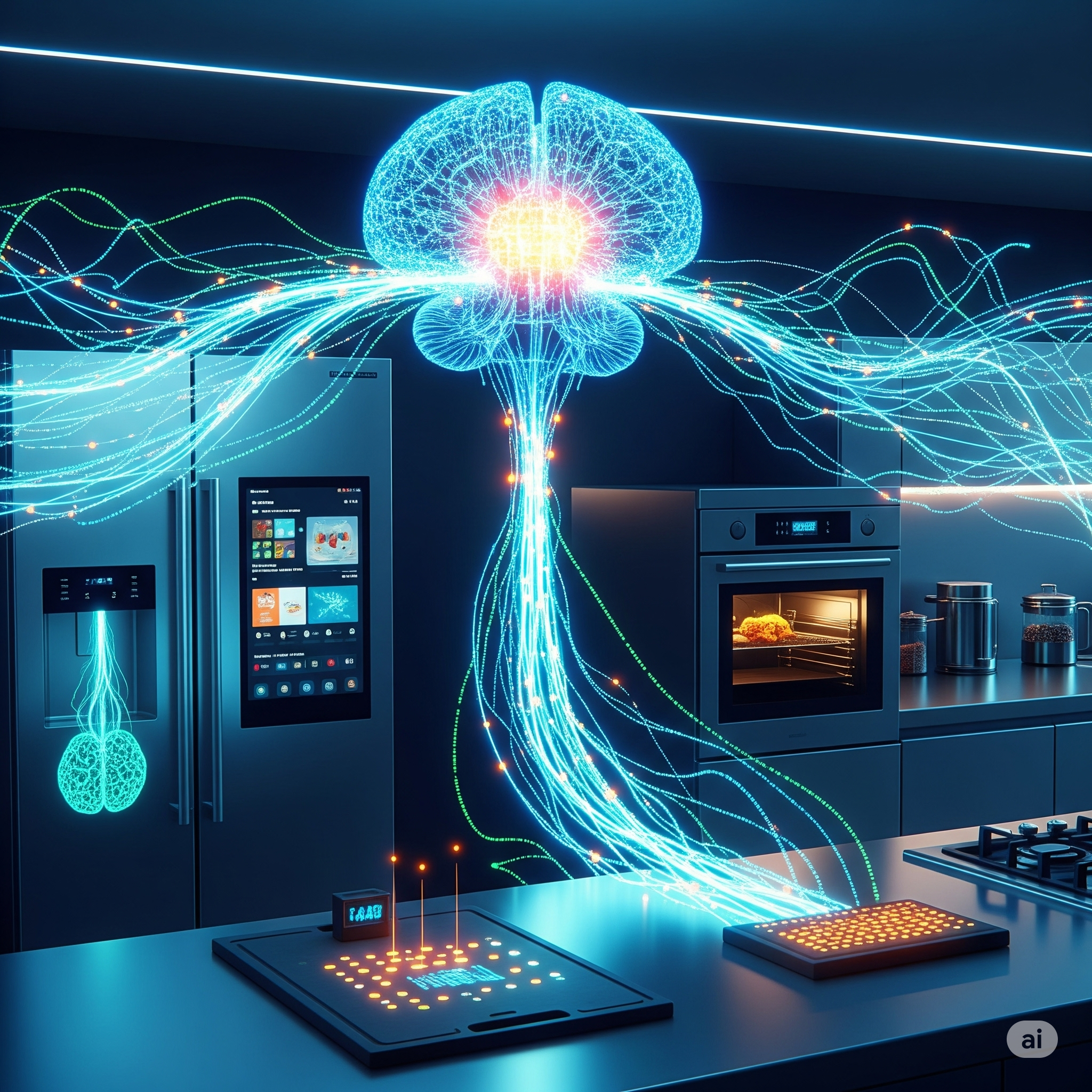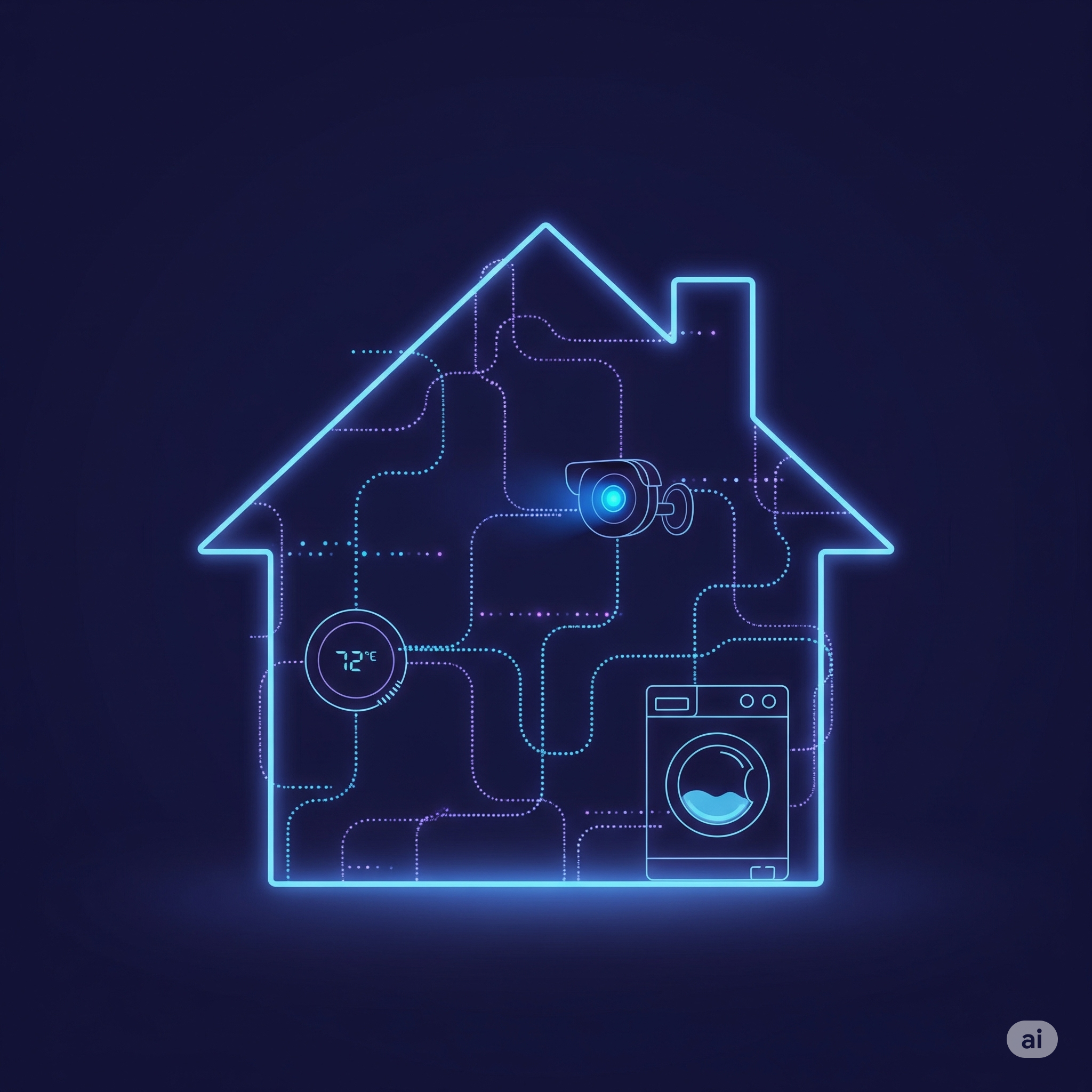Meta Description: Transform your cooking with AI. Discover how smart kitchen tech, from intelligent refrigerators to robot chefs, is revolutionizing meal planning, reducing food waste, and making home cooking easier and more precise.
Table of Contents
- The Kitchen’s Digital Transformation
- The AI Meal Planning Revolution
- Intelligent Appliances: Your Cooking Co-Pilots
- The Rise of the Robot Chef
- AI for Health: The Personalized Diet
- The Human-AI Kitchen of the Future
- FAQ Section
- Conclusion
The Kitchen’s Digital Transformation
The kitchen has long been the heart of the home, a place of creativity and tradition. But a quiet revolution is underway, powered by artificial intelligence. AI is moving beyond simple voice commands and into the very fabric of our culinary routines, from the moment we decide what to cook to the final clean-up. This isn’t just about having a smart speaker play your favorite cooking playlist; it’s about a new level of intelligent assistance that makes meal planning effortless, cooking more precise, and food waste a thing of the past.
AI in the kitchen is about a seamless integration of technology that feels more like magic than machinery, empowering home cooks of all skill levels to create healthier, more delicious meals with less effort.
The AI Meal Planning Revolution
For many, meal planning is a chore. Staring into a half-empty fridge, trying to decide what to make, and then compiling a shopping list can be a source of daily stress. AI is changing this by becoming a proactive and personalized meal planner.
- Smart Inventory Management: Appliances like the Samsung Family Hub refrigerator use internal cameras and AI to track your food inventory. They can recognize items and notify you when you’re running low on essentials, or when something is nearing its expiration date, helping you reduce food waste.
- Personalized Recipe Generation: AI-powered apps and devices can generate recipes on the fly based on what ingredients you have available, your dietary restrictions, and even your health goals. You can simply say, “I have chicken, spinach, and mushrooms,” and the AI will suggest a recipe tailored to your needs.
- Automated Grocery Lists: Once a meal plan is created, the AI can automatically generate a grocery list. Advanced systems can even compare prices across different stores and add items to your preferred online shopping cart, streamlining the entire process.
Case in Point: A family struggling with dinner ideas can use an AI app to create a full weekly menu based on what’s already in their pantry, ensuring they use up ingredients before they spoil and saving money on unnecessary shopping trips.
Intelligent Appliances: Your Cooking Co-Pilots
AI is not just about planning; it’s about the execution. Smart kitchen appliances are using AI to become your personal cooking co-pilots, ensuring every dish is a success.
- Smart Ovens: The latest smart ovens feature integrated cameras and AI that can identify what you’re cooking and automatically adjust the temperature and cooking time. Some can even recognize the type of steak you’ve placed inside and ensure it’s cooked to your preferred level of doneness, from rare to well-done.
- Robot Vacuums: The latest models use computer vision and machine learning to map out your kitchen, identify and avoid obstacles like a stray toy or pet bowl, and adjust their cleaning patterns for maximum efficiency.
- AI-Enhanced Blenders and Coffee Makers: Smart blenders can use AI to sense the ingredients you’ve added and adjust the blending speed and duration for the perfect consistency. Smart coffee makers can learn your morning routine and brew your perfect cup of coffee at the exact time you need it.
Did You Know? Research indicates that the global smart kitchen appliances market is projected to reach over $77 billion by 2030, driven largely by the integration of AI and IoT technologies.
The Rise of the Robot Chef
While still a luxury, robot chefs are the most futuristic application of AI in the kitchen. These robotic systems are designed to perform complex culinary tasks with a level of precision and consistency that a human can’t easily replicate.
- Moley Robotics: This is a fully robotic kitchen that can mimic the movements of a professional chef. It can prepare over 5,000 different dishes by accessing a cloud-based recipe library, ensuring every meal is cooked to perfection, every single time.
- Automated Cooking Devices: Companies are developing robotic arms and multi-cookers that can stir, chop, and even flip food. These are perfect for complex dishes that require constant attention, freeing up the home cook to focus on other tasks.
Local Insight: For those living a fast-paced life, the promise of a device that can prepare a meal from scratch with a single command is a game-changer, especially for busy professionals and families in major cities.
AI for Health: The Personalized Diet
AI is not only about convenience; it’s also a powerful tool for health and wellness. AI-powered nutrition apps can analyze your dietary data from wearables and other sources to provide hyper-personalized recommendations.
- Nutritional Analysis: Apps can analyze a photo of your meal to estimate its calorie and nutrient content, eliminating the need for manual logging.
- Personalized Diet Plans: AI can create meal plans that are not just convenient but also optimized for your specific health needs, whether you’re trying to manage a condition, lose weight, or build muscle.
- Predictive Health Insights: By analyzing your eating patterns, AI can even offer proactive health advice, suggesting dietary adjustments to help you feel your best.
The Human-AI Kitchen of the Future
The future of the kitchen isn’t a soulless, automated factory. It’s a harmonious partnership between human creativity and AI precision. AI will handle the repetitive, mundane tasks, allowing you to rediscover the joy of cooking. You can focus on the art of a dish, the flavor combinations, and the pleasure of sharing a meal, while AI ensures the temperature is perfect, the timing is precise, and your pantry is always stocked.
The AI-powered kitchen is not about replacing the human chef; it’s about making every home cook a culinary master.
FAQ Section
Q1: Is an AI-powered refrigerator worth the cost? A: For those who value inventory management, automated shopping lists, and a centralized hub for family communication, the investment can be significant in terms of convenience and waste reduction.
Q2: How can I start using AI in my kitchen on a budget? A: You don’t need a robot chef. Start with an AI-powered meal planning app or a smart speaker to get recipe ideas and set cooking timers.
Q3: Can AI-generated recipes be trusted? A: AI can generate creative and well-structured recipes, but it’s important to use common sense. Recipes from reputable platforms are often tested, but always verify quantities and cooking times.
Q4: How does AI help with food allergies? A: AI can filter recipes and meal plans to exclude ingredients based on your specified allergies or dietary restrictions, helping you stay safe.
Q5: Is AI in kitchen appliances a privacy risk? A: Smart devices collect data to function. Be sure to read the privacy policies of the manufacturers and understand what data is being collected and how it’s being used.
Q6: What is the difference between a smart appliance and an AI-powered appliance? A: A smart appliance is typically just connected (e.g., you can turn it on with your phone). An AI-powered appliance has the ability to learn, adapt, and make autonomous decisions based on data.
Q7: Will AI-powered kitchen technology become more common? A: Yes. As the cost of sensors and AI algorithms decreases and consumer demand for convenience rises, AI-powered kitchen technology is expected to become a standard feature.
Q8: Can AI help me learn to cook? A: Absolutely. Many AI-powered platforms offer step-by-step guidance, personalized tips, and even video tutorials that can help you improve your cooking skills.
Conclusion
AI is no longer a futuristic concept confined to labs; it’s now a practical, everyday tool in our kitchens. By streamlining everything from meal planning to cooking execution, AI is reducing the friction of daily life and enabling us to make smarter, healthier, and more enjoyable choices about the food we eat. The kitchen of the future is here, and it’s powered by intelligent technology working alongside the home cook to create a new era of culinary convenience and creativity.
SEO & Technical Suggestions
- Primary Keyword: AI in the Kitchen
- Secondary Keywords: Smart kitchen appliances, AI meal planning, cooking assistance, robot chefs, intelligent refrigerator, smart ovens, food waste reduction.
- Schema Markup Suggestions: Use
ArticleorBlogPostingschema. Consider usingFAQPageschema for the FAQ section. - Internal Link Suggestions: Link to previous articles on AI in the home, the future of AI, or smart technology trends.
- External Link Suggestions: Link to reputable sources like food magazines, tech review sites (e.g., CNET, PCMag), and the websites of companies mentioned (e.g., Moley Robotics, Samsung).
- Featured Image Suggestion: An eye-catching and conceptual image. A digital, futuristic, glowing brain or network of data lines sits in the center of a stylized kitchen. The data streams flow out from the brain to different kitchen appliances, like a smart refrigerator, an oven, and a cutting board, indicating the AI’s influence and connection. The color palette should be vibrant, with deep blues, electric greens, and hints of orange.





